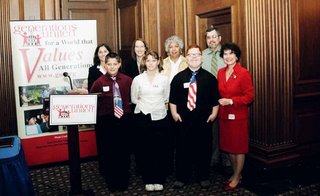 My have feet have hardly touched the ground since I last posted. I have been in Arizona meeting with developers and scoping out a site for a video shoot, in Iowa speaking at a conference, and in California helping to think through a project to build new, livable, multigenerational communities.
My have feet have hardly touched the ground since I last posted. I have been in Arizona meeting with developers and scoping out a site for a video shoot, in Iowa speaking at a conference, and in California helping to think through a project to build new, livable, multigenerational communities.And in between, I moderated GU’s own Hill briefing on subsidized guardianship! Here’s a picture of our terrific panel – thanks to Senators Clinton and Snowe we were in the Capitol Building in a room right by the Senate Chamber.
The photo was taken by Mike Patterson – thanks Mike! Our three speakers, Leslie Cohen (University of Illinois at Urbana-Champaign), Amy Miller (Juvenile Rights Project Inc) and Charlotte Price are along the back. Charlotte’s standing next to her husband, Glenn, and their grandchildren are standing in front with me. It was fantastic to hear Charlotte’s moving story – you can read it along with a host of others, here.
If you want more detail, all the materials are available online. And we even have an audio file of the meeting – I’ll warn you in advance it’s a whopping 58MB – if you want to experience the whole thing! E-mail if you’d like a copy.
My visit to California was also really inspiring. It’s a great example of how we’re moving forward as a society and (I hope) learning to plan for a multigenerational future. I was speaking with a team who are working together to plan for some new, truly livable communities – and that means including people from every generation. This isn’t the kind of thing that happens overnight – in fact it’s going to take them 20 years! It’s very exciting to be in at the beginning of such a great project.
Let me know what you think. What do you think planners and developers should consider when they want to build multigenerational communities?

